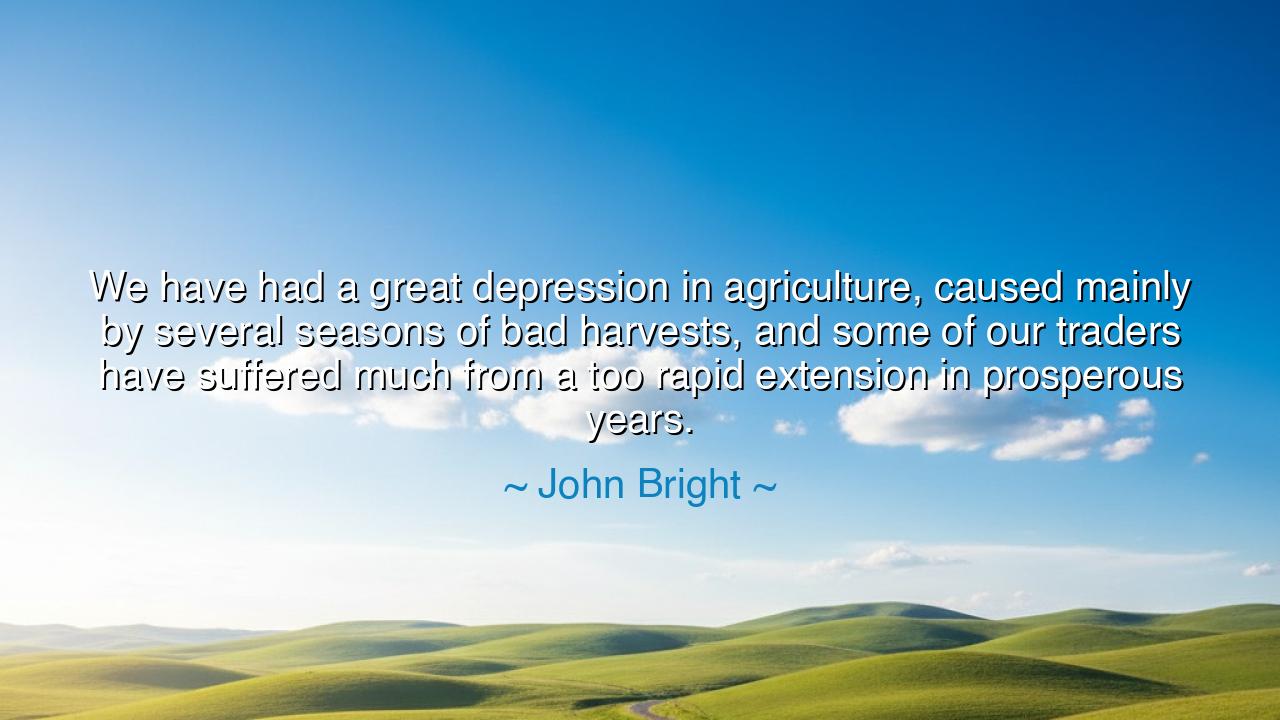
We have had a great depression in agriculture, caused mainly by
We have had a great depression in agriculture, caused mainly by several seasons of bad harvests, and some of our traders have suffered much from a too rapid extension in prosperous years.






“We have had a great depression in agriculture, caused mainly by several seasons of bad harvests, and some of our traders have suffered much from a too rapid extension in prosperous years.” Thus spoke John Bright, the great orator and reformer of nineteenth-century England, whose voice thundered on behalf of the common man. In these words, Bright offers more than mere commentary on the economic troubles of his age — he speaks a timeless truth about prosperity and prudence, fortune and folly, and the cycles of human endeavor. His insight stands as a mirror held up to all ages, reminding us that prosperity, though sweet, is not without danger, and that excess in good times often sows the seeds of ruin in bad ones.
This quote was born amid the turbulence of the Industrial Revolution, a time when Britain stood astride the world in power and trade, yet within her borders many suffered. The land, the farmer’s lifeblood, had turned against them — poor harvests had withered crops, and the bounty of the earth, once generous, had become cruelly stingy. Meanwhile, in the cities and ports, merchants who had once flourished in the glow of plenty were now crushed beneath the weight of overreach. Bright saw what many ignored: that unrestrained expansion, when fueled by greed and not guided by wisdom, leads not to lasting wealth, but to collapse.
In his words, we see two truths intertwined — one natural, the other moral. The first is that nature herself has cycles: times of growth and times of famine, of harvest and of drought. The second is that man, in his ambition, forgets this rhythm. In years of abundance, he stretches his reach beyond reason, building too high upon foundations not yet settled. Then, when the season turns — as it always does — he finds himself undone by his own excess. The farmer who plants more than the soil can bear, the trader who borrows more than prudence allows — both fall prey to the same blindness. Bright’s wisdom is not about commerce alone, but about the eternal necessity of balance, of knowing when to act and when to wait.
History is filled with echoes of this lesson. Consider the Great Depression of the twentieth century, when the glitter of the 1920s gave way to desolation. In those years of prosperity, the world danced upon a fragile bridge of credit and speculation. Farmers overproduced, industries expanded recklessly, and traders believed the upward climb would never end. But as in Bright’s time, the harvest turned bad — markets crashed, banks crumbled, and millions were cast into hardship. The error was the same as he warned against: the belief that success can be stretched endlessly without heed to its roots. What begins as confidence too often ends as arrogance, and from arrogance, downfall is born.
Yet there is also in Bright’s reflection a note of compassion. He does not condemn those who suffer; he grieves for them. He understood that human beings, in their labor and hope, are bound to the forces they cannot always control — the weather, the markets, the ebb and flow of fortune. His warning, then, is not one of scorn but of sympathy, a call to temper prosperity with foresight, and ambition with humility. For the wise man does not curse the storm; he prepares his shelter while the sun still shines.
The lesson, my children, is clear: do not mistake prosperity for permanence, nor misfortune for finality. Life, like the earth, moves in cycles. When the years of plenty come, enjoy them — but save, plan, and build with care. Let not your wealth make you reckless, nor your success make you proud. And when the hard years arrive, meet them not with despair, but with patience and resilience, knowing that the seasons turn and spring will come again. The world belongs not to the hasty, but to the steadfast — those who plant with foresight and endure with courage.
Thus, in John Bright’s simple observation, we find the ancient law of equilibrium: that moderation is the root of endurance. The farmer must learn it from the soil, the trader from the market, the leader from the heart of his people. To live wisely is to live in harmony with the rhythm of things — to work when it is time to sow, to rest when it is time to wait, and to give thanks when the harvest returns. Remember this: fortune is not a constant sun, but a turning wheel. Hold fast in both plenty and scarcity, and you will find peace not in circumstance, but in wisdom.
For the earth will always have its bad harvests, and humanity its periods of overreach. But those who learn, as Bright taught, to temper their ambition with prudence, and their prosperity with gratitude, will never truly be impoverished. Their wealth lies not in what they gain, but in what they understand: that the measure of greatness is not how high one rises in times of abundance, but how wisely one endures when the tide begins to fall.






AAdministratorAdministrator
Welcome, honored guests. Please leave a comment, we will respond soon